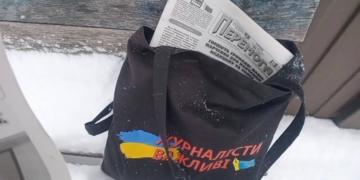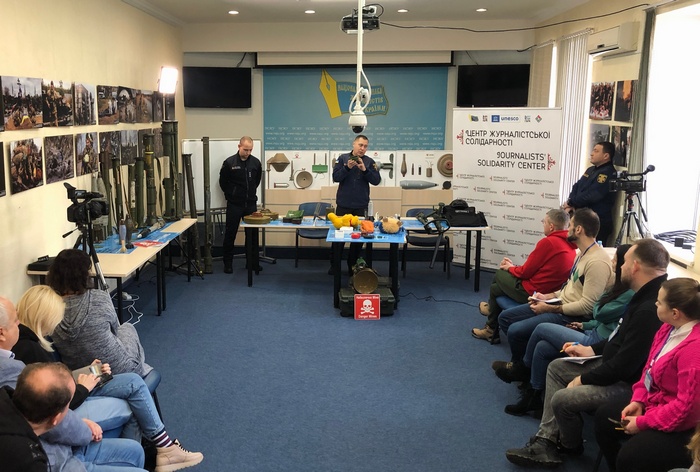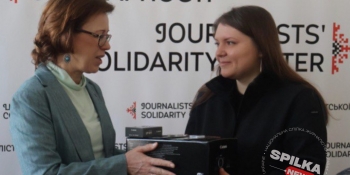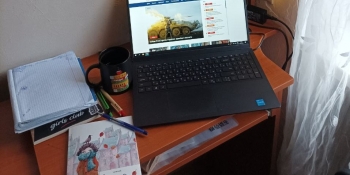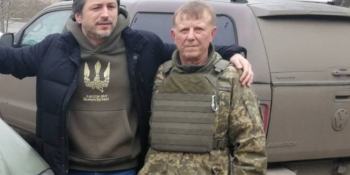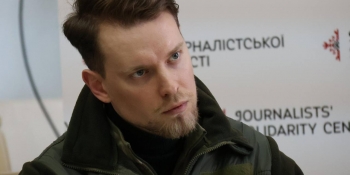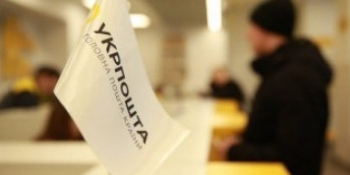Journalists who cover the war and its consequences are well-aware of the high danger of their work. However, it will never be superfluous to remind colleagues of the rules, which sometimes seem to be simple. Kyiv-based Journalist Solidarity Center of National Union of Journalists of Ukraine (NUJU) hosted a training session entitled Anti-mine Safety: Journalist’s Work in De-Occupied Territories and in War Zone.
Practical advice was provided by certified instructors – professional sappers Yurii Tsykeniuk and Ivan Shepelev, who have experience in demining territories after the explosions at ammunition depots in Novobohdanivka, Lozova, Balakliya, liberated Sloviyansk in 2014, Bucha, Irpin and Borodianka this year.
“Many journalists now work in conditions of increased danger. That is why we organize educational seminars with professional trainers. We want to equip media workers with knowledge as much as possible, so that they work consciously and safely in de-occupied territories, on the front lines and in peaceful cities where rocket fragments fall,” noted Sergiy Tomilenko, the President of the NUJU.
In a war zone, it is very important to follow safety rules, because even a visually clean area can be dangerous for people’s lives.
“We change tactics, and the enemy changes tactics. Mines are dug into the soil, so they cannot always be seen, and equipment cannot always work properly. Therefore, in the de-occupied territories, it is better for journalists to work where sappers have already visited, and even better – if such territories had been visited two or three times,” stressed Yurii Tsykeniuk.
According to the coach, one should not underestimate the danger, which is not visible at first glance, because explosives have a better chance of winning in a mine-man match.
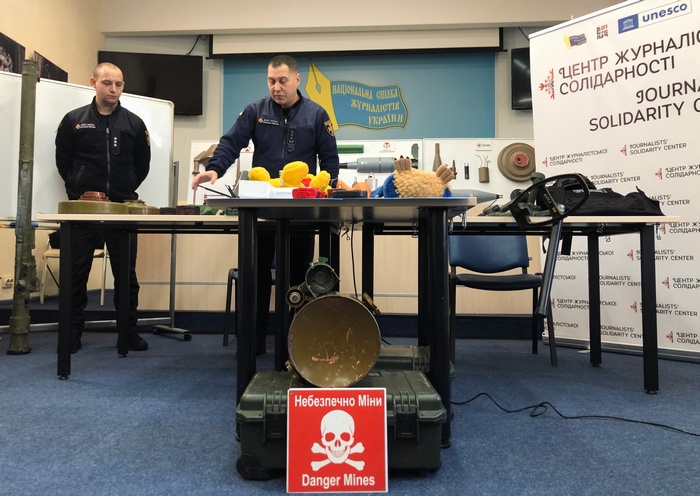
“If you think that mine can be fooled, then you are mistaken. It is better to step aside. You can’t step on a mine with your foot, and then remove your foot and stay alive. It’s all a myth,” said the experienced sapper.
In October, many journalists in pursuit of efficiency went to the de-occupied Kherson the day after the city was cleared. The sappers told why it can’t be done like that.
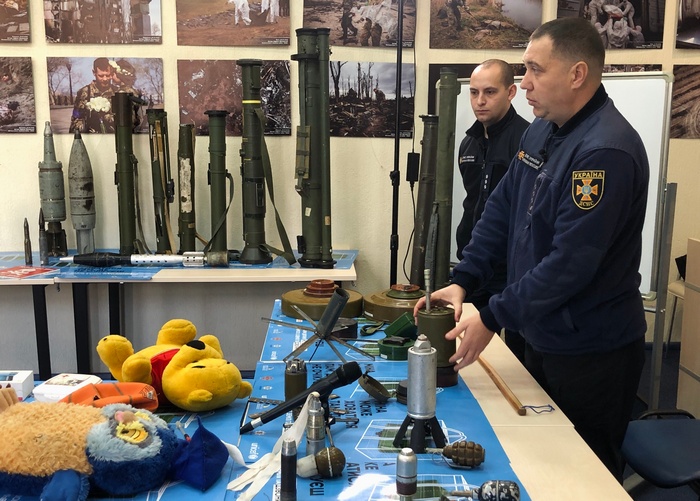
“Whatever the desire is, you can’t go to the de-occupied territory the next day after liberation. Because Irpin, Bucha, Borodianka were demined for three months, and it cannot be said that everything has been cleared. Imagine how long it would take to clean up Mariupol or Bakhmut. Do not search for a sensation. It is clear that journalists are needed more than anyone else, but the enemy is insidious, the enemy changes tactics,” Yuri addressed the journalists.
If a journalist notices a strange object that looks like an explosive, sappers strongly advise to stay away from it and inform the relevant authorities.
“We have four experienced sappers and only one novice for demining. You understand how serious everything is. This is to prevent journalists or other civilians from demining and destroying any explosive device on their own,” the trainer noted.
The participants in the training also got acquainted with already defused explosive objects – mines, step-activated mines, grenade launchers and even children’s toys, in which the Russians wrapped explosives.
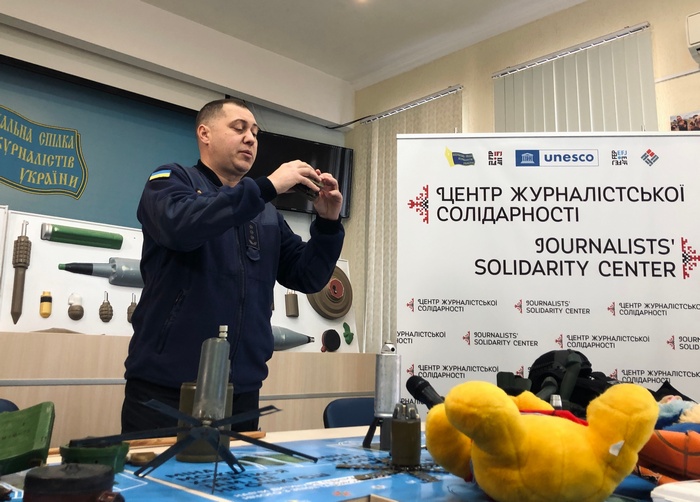
“Interesting and useful. Complex information was put simply. And a big plus is they gave life examples,” Ihor Namchuk, a journalist of the Businessman publication, shared his impressions of the training.
Kherson journalist Vladyslav Hladkyi, who is familiar with work in the de-occupied territory, agrees with his colleague.
“Such trainings are necessary because they can save lives,” said Vladyslav.
The Anti-mine Safety training is one of six trainings on the safety of journalists during war, organized by the network of the NUJU Journalist Solidarity Centers with the support of UNESCO. The next training will take place in January and will be devoted to the safety of the work of female journalists.
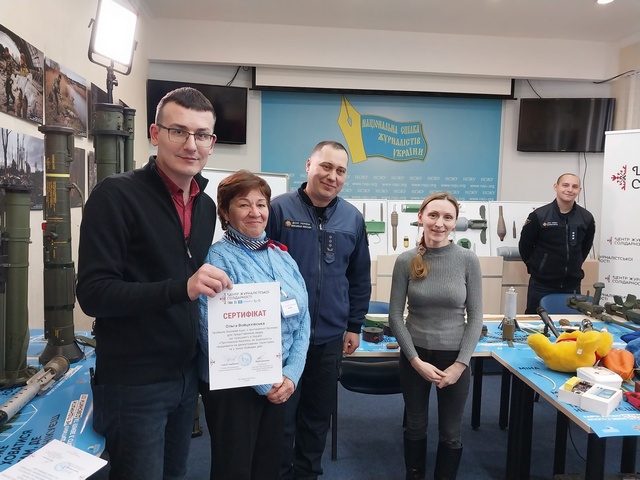
The Journalist Solidarity Centers are an initiative of the NUJU, which is implemented with the support of the International and European Federations of Journalists, as well as UNESCO. The network is designed to help media representatives working in Ukraine during the war. The centers work in Kyiv, Lviv, Ivano-Frankivsk, Chernivtsi, Zaporizhzhia, Dnipro and provide journalists with organizational, technical, legal, psychological, and other aid.
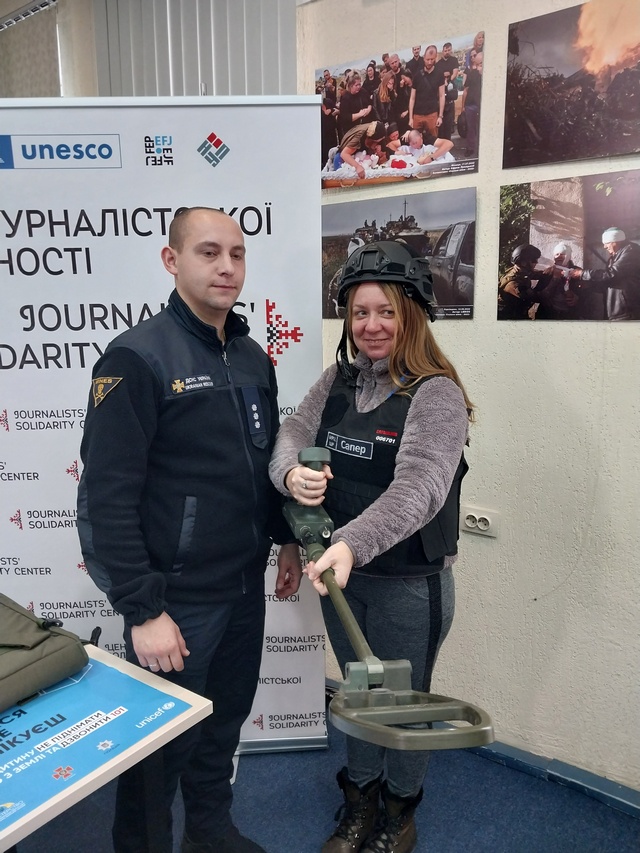
About UNESCO.
UNESCO is the United Nations Educational, Scientific and Cultural Organization. It contributes to peace and security by promoting international cooperation in education, sciences, culture, communication and information. UNESCO promotes knowledge sharing and the free flow of ideas to accelerate mutual understanding. It is the coordinator of the UN Plan of Action on the Safety of Journalists and the Issue of Impunity, which aims to create a free and safe environment for journalists and media workers, thus strengthening peace, democracy and sustainable development worldwide. UNESCO is working closely with its partner organizations in Ukraine to provide support to journalists on the ground.
The designations employed and the presentation of material throughout this publication do not imply the expression of any opinion whatsoever on the part of UNESCO concerning the legal status of any country, territory, city or area or its authorities, or concerning the delimitation of its frontiers or boundaries.
The author is responsible for the choice and the presentation of the facts contained in this publication and for the opinions expressed therein, which are not necessarily those of UNESCO and do not commit the Organization.





